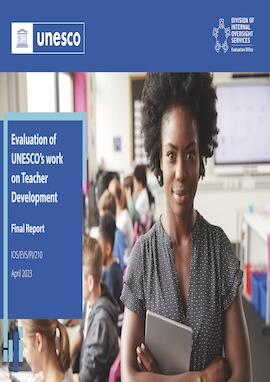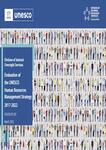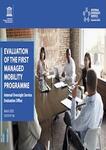Page Header

Downloads:
4
Evaluation of UNESCO's work in the area of teacher development
Overview
eachers are recognized as the single most critical factor influencing educational quality. Nonetheless, a quantitative and qualitative teacher gap remains a global challenge and most acute in parts of the world where increased educational quality for all is most needed. To address the shortage of qualified teachers, UNESCO, as the custodian agency for SDG 4, has been advocating for decades for more comprehensive teacher policies that cover all issues relating to the teaching profession, such as teacher education and training, recruitment, competences, status, working conditions, as well as issues related to health and teacher career and salaries. UNESCO has also been leading and coordinating the global teacher development agenda as well as supporting Member States through advocacy, normative guidance, policy and capacity development work, and the development and dissemination of research papers, knowledge products and good practices to promote a humanistic and rights-based perspective on teacher development. While the evaluation largely confirms UNESCO’s success in performing its global leadership and coordination role, and recognizes UNESCO’s contributions to significant developments at global, regional, and national levels, it also identified aspects that could help further strengthen UNESCO’s work on teachers. Highlighting UNESCO’s added value in this specific area is crucial as teacher development has become a crowded space where other and new development partners are becoming increasingly active. The evaluation is calling for ever more coordination and cooperation while capitalizing on UNESCO’s comparative strengths: its convening power, its role as a norm-setter and as the lead for monitoring the progress towards SDG. The evaluation further suggests strengthening the promotion and mainstreaming of gender equality and inclusion across all dimensions of UNESCO’s teacher development work.Report Details
| Year Published | |
| Type | |
| Theme/s | |
| Joint | No |
| Partner/s | N/A |
| SDG/s | |
| Consultant name | |
| Agency Focal Point | Martina Rathner |
| Focal Point Email | m.rathner@unesco.org |
| Managed by Independent Evaluation Office | Yes |
| Geographic Scope | Global |
YOU 'RE READING
Evaluation of UNESCO's work in the area of teacher development









